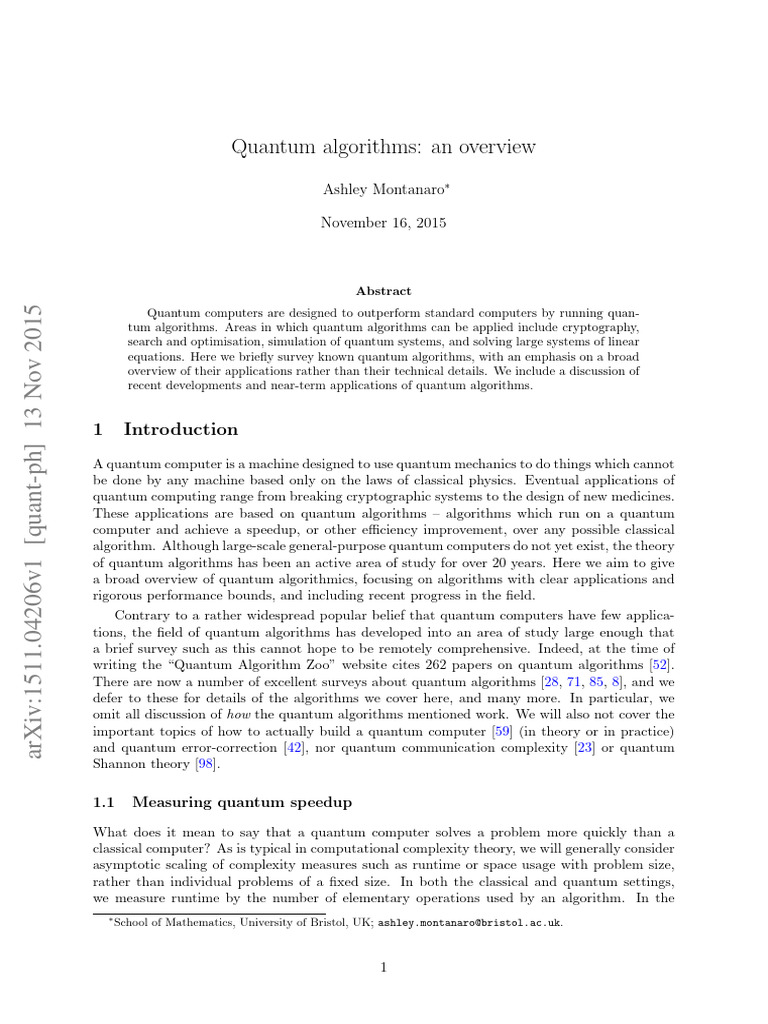In the rapidly evolving realm of quantum computing, algorithms serve as the cornerstone for unlocking the unparalleled potential of quantum mechanics. Traditional computing paradigms grapple with limitations rooted in classical physics, while quantum algorithms promise to transcend these boundaries, propelling us into uncharted territories of computational power and capability. As we delve into some of the most fascinating quantum algorithms, it becomes evident that they not only catalyze advancements in various scientific fields but also challenge our foundational understanding of computation.
Quantum algorithms leverage the principles of superposition and entanglement, elements intrinsic to quantum systems, to execute operations at speeds inconceivable by classical counterparts. This article explores several of the most intriguing quantum algorithms, elucidating their mechanisms and implications while igniting curiosity about their applications.
1. Shor’s Algorithm: Disrupting Cryptography
Arguably the most celebrated quantum algorithm, Shor’s algorithm revolutionizes factorization—a fundamental task crucial for the security of modern cryptography. In classical computing, factoring large integers is computationally intensive, rendering systems like RSA secure. However, Shor’s algorithm employs quantum Fourier transform to reduce the problem’s complexity exponentialy. As a result, it can factor large numbers in polynomial time, jeopardizing the security of encryption methods that underpin the digital age. The implications of Shor’s algorithm invoke a spectrum of societal concerns, challenging the very foundations of data security and demanding a re-examination of cryptographic protocols.
2. Grover’s Algorithm: Accelerating Search
In contrast to Shor’s algorithm, Grover’s algorithm addresses the problem of unsorted database searching. By employing a clever quantum approach, Grover’s algorithm achieves a quadratic speedup over classical algorithms, requiring only O(√N) evaluations to find a marked item among N possibilities, whereas classical approaches necessitate O(N) queries. This quantum advantage has profound ramifications in various fields, including cryptography, optimization, and even artificial intelligence, where searching vast datasets efficiently can lead to significant breakthroughs. Grover’s algorithm exemplifies how quantum computing can solve problems deemed intractable with classical means, thus invigorating research endeavors across multiple disciplines.
3. Quantum Fourier Transform: The Foundation of Quantum Algorithms
The quantum Fourier transform (QFT) is a pivotal algorithm that underpins many other quantum algorithms, including Shor’s. It transforms a quantum state into its frequency components, facilitating the extraction of periodicities in data. Utilizing the principles of superposition, QFT operates exponentially faster than its classical counterparts. Where a classical Fourier transform requires O(N log N) time, the QFT achieves this in O(log N) time, showcasing the potential efficiency gains of quantum computations. The QFT’s versatility makes it an essential tool for quantum simulations and various quantum machine learning algorithms, paving the way for novel applications.
4. Variational Quantum Eigensolver: A New Frontier in Quantum Chemistry
The variational quantum eigensolver (VQE) is a hybrid algorithm that bridges classical and quantum computing, making it particularly suitable for near-term quantum devices. By exploiting the quantum state’s capabilities to optimize parameters iteratively, VQE effectively approximates the ground state energy of quantum systems. This algorithm has garnered significant attention within the field of quantum chemistry, where accurately predicting molecular properties is paramount. The ability to perform such calculations with quantum hardware may herald breakthroughs in drug discovery, material science, and molecular modeling, revolutionizing our approach to complex quantum systems.
5. Quantum Approximate Optimization Algorithm: Solving Combinatorial Problems
The quantum approximate optimization algorithm (QAOA) targets combinatorial optimization problems, which are ubiquitous in logistics, finance, and network design. By exploiting quantum superposition, QAOA finds approximate solutions to problems that are classically intractable. Its iterative nature allows for adjustable circuit parameters to be tuned, enhancing its performance based on specific instances. As researchers delve deeper into algorithms like QAOA, it may eventually empower industries facing optimization challenges to uncover optimal solutions swiftly and with unprecedented efficiency.
6. Qubit Participation in Machine Learning
The intersection of quantum computing and machine learning is a burgeoning field that holds immense potential. Algorithms such as quantum support vector machines (QSVM) leverage quantum computing principles to perform classifications with improved efficiency. The ability to represent complex datasets in higher dimensional spaces using quantum states may provide enhanced performance for tasks like pattern recognition and clustering. Machine learning represents a significant frontier where quantum algorithms can shine, promising substantial advancements in predictive analytics, natural language processing, and image recognition.
7. Quantum Simulation: Exploring Uncharted Territories
Perhaps one of the most profound applications of quantum algorithms lies in quantum simulation. This technique simulates quantum systems that are difficult or impossible to study experimentally or classically. Quantum simulators enable researchers to explore phenomena in condensed matter physics, high-energy physics, and cosmology, potentially elucidating the mysteries of our universe. The quantum simulation approach resonates with the very essence of scientific inquiry, offering insights that could reshape our understanding of fundamental processes governing matter and energy.
As quantum computing technology continues to evolve, the algorithms discussed above represent just a glimpse into the boundless possibilities that await exploration. Each algorithm not only demonstrates the remarkable capabilities of quantum systems but also heralds a shift in our perceptions of computation itself. These quantum algorithms invite us to envision a future where complex computations are executed with unprecedented efficiency, opening doors to innovations that could transform society across multiple dimensions. The journey into the quantum realm is fraught with challenges, yet the allure of the unknown compels us to venture forth into this exciting frontier of scientific discovery.












